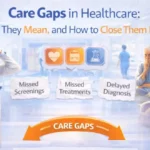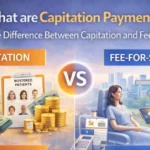Medication Therapy Management: An Essential Overview for Providers

The U.S. healthcare system is in urgent need of value-based medication models to address the growing burden of chronic diseases. Providers continually look for smarter approaches to enhance patient outcomes while optimizing operational efficiency. Medication Therapy Management (MTM) emerges as one of the most effective solutions to meet these challenges.
The U.S. alone witnessed 350,000 hospitalizations every year, resultant from adverse drug events. Additionally, poor medical adherence causes around 125,000 deaths annually, costing the healthcare system over $100 billion!
These figures highlight the need for a system supporting ongoing medication oversight, just like MTM. Medication Therapy Management is a proven clinical intervention that reduces problems caused by poor medication adherence. Studies show that MTM yields around a 4:1 ROI through reduced ER visits and therapy duplication.
Whether you are a solo practitioner or the leader of a multi-venture healthcare setup, implementing MTM can help you scale and offer comprehensive care to patients with chronic illnesses. In this blog, we will explore significant details of Medication Therapy Management and its implications for health providers.
Table of Contents
ToggleWhat is Medication Therapy Management?
The U.S. government, in 2003, introduced the Medicare Prescription Drug, Improvement and Modernization Act. Medication Therapy Management (MTM) was introduced as a key component of the legislation. MTM focuses on helping patients understand their medications and preventing harmful drug interactions.
It is a patient-centric service aiming to optimize therapeutic outcomes for patients. Pharmacists and other healthcare professionals perform medication therapy management to ensure patients use medications appropriately, safely, and effectively, and stick to their treatment plans.
How Does MTM Work?
MTM begins with a CMR (comprehensive medication review), based on which health professionals develop a personalized medication action plan (MAP). The MTM process includes the following steps-
- Patient enrolment- Patients with one or more chronic illnesses are enrolled in an MTM program through a Medicare Part D plan or referral from a provider.
- Medication review- Pharmacists and concerned healthcare professionals run a thorough review of all the medications and ongoing treatment plans.
- Intervention and referral Depending on the severity and complexity of their conditions, patients may be referred to other healthcare specialists.
- Documentation- All interactions are documented for future reference.
- Follow-up- In a continuous cycle, healthcare providers analyze patient documents and reports and review them for continuous improvement. With the help of MTM tools like those offered by HealthArc, providers track adherence to medication schedules, document, and perform regular follow-ups to streamline MTM delivery.
Who Can Qualify for the MTM Program?
The Centers for Medicare & Medicaid Services (CMS) has established criteria to identify beneficiaries for MTM under Medicare Part D. This aims to recognize and offer MTM services to patients who may benefit from a structured medication management approach. Eligibility for MTM is based on factors like-
- Multiple Chronic Diseases- Medication Therapy Management (MTM) is especially valuable for patients managing multiple chronic conditions—typically two or more. These patients often have complex medication regimens that require professional oversight to prevent harmful drug interactions and optimize therapy. Common chronic diseases addressed through MTM include diabetes, hypertension, asthma, COPD, and others.
- Consumption of Multiple Part-D Medications- Patients who require regular prescription and intake of eight or more Medicare Part-D-covered drugs can enroll in the MTM program. These medications demand oversight by experts as they often involve different drug classes.
- Annual Drug Costs- The annual cost of the patient’s Part D drugs must exceed $1,623. MTM focuses on high-utilization patients as they are at a greater risk for medication-related problems.
- Beyond Medicare- Several private insurance plans and employer-sponsored programs offer MTM to high-risk patients outside the Medicare population. The criteria might be different for them, based on their population needs and benefit design.
Eligible patients are typically auto-enrolled in the Medication Therapy Management (MTM) program by their Medicare Part D plan. However, participation is voluntary, and patients can opt out of the plan at any point.
4 Facts about MTM
Misconceptions about Medication Therapy Management surround the market, causing disinformation amongst providers are patients. Here are five key facts about MTM that every provider and patient with chronic illness must know.
#1 MTM is a Part of Medicare Part D Drug Benefit (PDPs and MA-PDs)
Beneficiaries must have Medicare Prescription Drug Plans (PDPs) and Medicare Advantage Prescription Drug Plans (MA-PDs) as per federal law to be eligible for MTM. They must comply with CMS guidelines. Here is what you need to know-
- Annual Comprehensive Medication Reviews- Each eligible enrolee receives at least one comprehensive medication review annually. This offers a detailed assessment of medications and provides the result summary and future course of action.
- Quarterly Targeted Medication Reviews- Alongside CMRs, providers must conduct quarterly TMRs to identity concerns and resolve problems like therapeutic duplications, safety issues, and non-adherence.
- Prescriber Interventions- On identifying a potential issue, the provider must communicate with the respective physician. This can lead to changes in treatment/therapy, such as dosage adjustments or removal of unnecessary drugs from the plan.
CMS regulates these requirements and monitors providers to ensure MTM programs follow best practices and stay in adherence with the updates to deliver the best value of care.
#2 MTM is NOT Prescription Dispensing or Disease Management
A common misconception is that MTM is like dispensing prescriptions or managing a chronic disease like diabetes. The scope of MTM is much wider.
- Patient-Focussed- Prescription dispensing is a logistical task. On the contrary, medication therapy management focuses on improving patient outcomes by identifying drug-related problems, improving adherence, and changing therapy when required.
- Collaborative- Several stakeholders, such as pharmacists, specialists, primary care providers, etc., partner to provide coordinated care to MTM beneficiaries. This collaborative approach ensures that the treatment is on par with the federal standards and aligns with the patients’ care requirements.
- Proactive and Preventive- Medication Therapy Management (MTM) empowers providers to deliver proactive care, helping prevent emergencies before they happen. For example, pharmacists can detect potentially harmful drug interactions and adjust therapy before the prescription is dispensed.
- Multi-Disease Management- While disease management is centred around a single ailment and its cure, MTM helps patients manage medications for multiple chronic diseases at once, without the risk of harm.
#3 MTM Empowers Patients
MTM allows patients to participate in the chronic disease management process actively. It begins by educating patients and engaging them with the goal of better adherence and improved outcomes. To empower patients, MTM-
- Helps Them Understand Medication Purpose- Learning the purpose and goal behind each medication educates and motivates patients to adhere to it. MTM clarifies the role of each drug and its positive effect on the patient’s health.
- Teaches Them Correct Usage- MTM teaches patients how and when to take their medications. This enables patients to be more attentive about the medications they must take with food or empty stomach, achieving maximum effect on their health.
- Recognizes Side Effects- Patients learn about potential side effects of the medications and ways to treat them. This can help them be prepared to deal with unforeseen situations and prevent complications to improve results.
- Improves Adherence- MTM aims to improve patient engagement in their treatment plans, which leads to heightened adherence. MTM encourages responsibility and health literacy to empower patients to take better care of themselves.
#4 MTM Services Provide Value
Healthcare has come a long way from traditional times when physicians wrote prescriptions and the patients were on their own to manage treatments. Medication Therapy Management has brought about a significant real-world impact, which can be depicted through these facts and figures.
- Improved Clinical Outcomes Through Proactive Intervention – Studies show that MTM programs have reduced hospital admissions by up to 30% in several facilities. This is especially true for patients with multiple chronic diseases and complex medication plans. Additionally, the results of a patient satisfaction survey indicate that 3% of respondents believe that MTM helped improve their overall health and well-being.
- Economic Impact: Reduced Healthcare Costs Through Fewer ER Visits and HospitalizationsA research published in the S. National Library of Medicine states that MTM services helped patients save $112 monthly. These savings were largely driven by a reduction in emergency visits and inpatient hospitalizations
Bonus: Employers and insurers providing MTM as a part of employee wellness programs witnessed increased employee productivity and reduced absenteeism.
Components of MTM
Medication Therapy Management possesses core components structured to improve patient medication use. Here are the key components of MTM that help minimize risk and enhance therapeutic outcomes.
- Medication Therapy Review- MTR is a consultation with the pharmacist where they assess all the medications for safety, efficacy, and appropriateness. This helps identify medication-related problems in the initial stages.
- Personal Medication Record- A PMR is a comprehensive list of over-the-counter drugs, supplements, and herbal products maintained by the patient.
- Medication-Related Action Plan (MAP)- Physicians, in collaboration with other healthcare providers, create a patient-focused plan known as MAP with actionable steps to achieve health goals. This plan is easy to understand and adhere to and is designed to improve medication use.
- Intervention/Referral- While dispensing the medications, pharmacists oversee drug combinations. If they detect an issue, they consult the physician to rectify it. They may also refer the patient to another physician for better coordination.
- Documentation and Follow-up– Documenting each step of the MTM process is quintessential. Later, providers schedule regular follow-ups with the patients to test the efficiency of interventions and amend the therapy plan as required.
5 Stages of MTM
Implementation of MTM for a patient with chronic illnesses involves a 5-step process that providers need to follow.
- History Assessment and Prescription- Medication management begins with an assessment of the patient’s condition and chronic ailments. Physicians analyze their medical history and choose the right medication. Then, they educate the patient about the dosage and side effects. This stage witness’s proper communication between the provider and patient, acting as a foundation for a safe and effective treatment plan.
- Dispensing Medication- After the physician prescribes the medication, the pharmacist verifies the prescription and looks for errors or dangerous combinations. Upon understanding the correct dosage and medication labels, pharmacists provide the medicines to the patients. They also counsel the patients on medication use and may offer compliance packaging to help patients.
- Administration and Compliance- In this stage, providers ensure that patients are adhering to the medicine schedule and are taking the right dosage at the right time. With the help of reminders through mobile apps or alarms, they ensure adherence to the treatment plan. Apart from this, they ensure patients face no trouble, such as side effects from the use of medication.
- Monitoring Effectiveness- This is a continuous process that helps providers understand the efficacy of the treatment plan. They make follow-up appointments with patients to evaluate treatment progress. Based on the results, they alter the medication therapy plan if required. Medication management is an ongoing process that helps improve treatment effectiveness.
- Adjustment or Discontinuation- This is the final stage of the MTM process, which occurs in cases like finishing a course of antibiotics. However, patients with chronic conditions may experience stages like adjustment or switching to a different regimen for better results, or if side effects prevail. Providers may also reduce dosage gradually or adjust medications over time to manage long-term conditions.
The MTM plan aims to ensure consistency in care by making providers adhere to this structured framework. It also enhances accountability and ensures measurable outcomes in MTM delivery.
What Does it Mean for Care Providers?
Incorporating Medication Therapy Management into their care program can mean heightened revenue and scalability for providers. MTM offers small practices an opportunity to improve care coordination while reducing staff workload and enhancing patient outcomes. In 2025, MTM serves as a lucrative expansion opportunity for providers looking to scale operations and tap into diverse revenue streams. Here’s how MTM is extremely beneficial-
- Improved Patient Safety- MTM has help prevent medication errors and offer improved patient safety, setting a benchmark of trust amongst patients. The health practices across the U.S currently experience around 3 million emergency visits per year as a result of adverse drug events (CDC). MTM can reduce such roadblocks and enable providers to offer better care to patients.
- Collaboration for Better Results- Providers offering MTM experience collaboration among physicians, pharmacists, and other care providers. This team-based model helps providers enhance care quality and ensure that everyone is on the same page.
- Support for Quality Metrics- Medication Therapy Management contributes to adherence to medication and reduced hospitalization. This helps providers procure improved STAR Ratings and HEDIS scores.
- Optimized Workflows- In a collaborative environment where multiple experts work as a team, the chances of errors are meagre and the workload is evenly distributed. For eg, pharmacists can take on the medication management burden and cross-check the prescription to ensure zero errors. Consequently, physicians can focus on diagnosis and disease management.
Let’s explain this further with a use case.
A family practice in Ohio partnered with clinical pharmacists to deliver Medication Therapy Management to patients with chronic illnesses. Within a year, they witnessed a reduction in medication-related hospital readmissions as patients were extremely adherent to their medication regimenAs a result, preventive care screenings increased, and the therapy began to yield positive outcomes.Additionally, the practice received value-based reimbursements and incentive payments by participating in programs led by CMS and private players.
Benefits of MTM
- Medication Therapy Management (MTM) is designed to benefit not only individual patients but also the broader healthcare system. Its positive impact extends across clinical, economic, and operational dimensions. Let’s take a closer look at the key benefits—supported by real-world data and statistics.
- Increased Adherence to Medication- Patients with chronic illnesses, especially those of age, are not exactly adherent to their medication schedules. According to a study that the Journal of Managed Care and Specialty Pharmacy conducted, MTM improved compliance in patients by 18%. This especially benefited patients with chronic conditions such as diabetes and hypertension.
- Greater Clinical Outcomes- Patients receiving MTM support witness better clinical outcomes in terms of steady blood pressure, cholesterol, A1C levels, and more.
- Reduced Healthcare Costs- MTM leads to an overall reduction in healthcare costs for patients. Evidence of cost reduction can be found in reduced hospitalizations, reduced medication costs, and better return on investment in terms of improved health. A study reported a cost saving of $2,913,850 from the patient’s end over 10 years with the help of MTM.
- Patient Education and Empowerment- By educating and empowering patients, MTM leads to self-efficacy. Patients are more invested in their overall well-being and show greater compliance with their medication regimen. Consequently, patients face reduced anxiety about medications and build more faith in the healthcare team.
- Enhanced Patient Satisfaction- Patient satisfaction is a key metric proving the effectiveness of MTM programs. Over 90% patients in Medicare MTM programs report heightened confidence in managing their health due to improved understanding of medications.
Tip: While MTM is an extremely advantageous practice, providers must be well-versed with the techniques and technologies involved. By offering personalized guidance and support to the patients, they can help build trust amongst patients and experience improved outcomes. Providers must also encourage patients to maintain and update their PMR after every provider visit to stay on track with medication practices. A combination of the best MTM practices and provider-patient engagement can lead to the best results.
MTM: Current Challenges
With a proven value, MTM has emerged as a model every provider must embed into their health facility. However, there are several challenges concerning implementation and scalability that providers face, which include the following.
- Inconsistent Reimbursement Models- Outside Medicare, getting uniform reimbursement may seem like a daunting task for providers. Consequently, they are unable to sustain non-Medicare MTM programs.
- Limited Patient Awareness- Enhancing awareness and engagement amongst patients can be difficult, especially amongst patients of age. Awareness campaigns aren’t impactful enough, and most eligible patients don’t know what MTM is and that they qualify for it.
- Time Constraints- While MTM is designed to ease workload in small facilities, often physicians resist it due to the time involved in learning new techniques and providing training to the staff. They are concerned about workflow disruption and time pressures.
- Fragmented Health IT Systems- Most health facilities in the U.S lack integrated systems. Communication and documentation amongst pharmacists, providers, caregivers, and payers isn’t streamlined, posing a serious challenge.
- Data Privacy and Compliance- Understanding and adhering to the compliance requirements is another task that makes MTM unappealing for providers. MTM must comply with HIPAA and other privacy regulations, and providers must have adequate knowledge or trained staff to manage compliance.
The Road Ahead
While several roadblocks make MTM implementation seem like a daunting process, solutions like HealthArc work hard to save the day. By offering scalable, secure, and interoperable MTM solutions, HealthArc helps teams overcome such barriers and deliver maximized patient outcomes.
HealthArc provides a robust MTM platform that simplifies care coordination. This absolutely digital platform supports providers in meeting compliance requirements while improving patient engagement. Featuring Automated CMR and TMR Workflows and Secure Provider-Pharmacist Communication Tools, HealthArc makes MTM integration easy for providers and their patients.
Other features of HealthArc’s exceptional MTM platform include Adherence Tracking and Alerts, Customizable Documentation Templates, and robust tools for Analytics and Outcome Reporting. Trusted by thousands of care providers across the U.S., HealthArc makes HIPAA compliance and CMS alignment easy for providers. Partnering with HealthArc can allow your practice to boost STAR ratings and reimbursement potential by witnessing skyrocketing patient satisfaction.
Visit HealthArc to see how you can seamlessly integrate Medication Therapy Management into your care service regime with the help of experts.
Conclusion
Medication Therapy Management is a smart, cost-effective, and clinically validated care model set to transform medication adherence in the healthcare sector. It ensures safer healthcare delivery in a time when the burden of polypharmacy and multimorbidity is ever-growing. By transforming the approach to chronic disease care and medication management, MTM has helped several small practices across the U.S. expand their scope of services and generate heightened revenue.
Embracing MTM implies better patient outcomes and better revenue, making it the right time for all healthcare stakeholders to integrate MTM into their practice– with the assistance of HealthArc!
Frequently Asked Questions (FAQs)
Medication Therapy Management is a drug-management service for patients with two or more chronic diseases. Care providers collaborate with pharmacists to ensure patients adhere to their drug regimen and adverse drug issues are resolved.
Medicare patients get access to MTM services without paying anything. However, MTM is not exclusive to Medicare patients, and some private insurance plans also provide it to their beneficiaries.
Medication reconciliation is a one-time thing where physicians check your medicines once during care transitions. Medication therapy management, on the contrary, is a continuous process where experts ensure you take the right medicine at the right time and avoid dosage errors.
MTM is covered either under Medicare or through your private insurance provider.
The steps of MTM include history taking, dispensing medicines, administering dosage and adherence, monitoring results, and adjusting the therapy as required.
The most essential components of MTM include Medication Therapy Review (MTR), Personal Medication Record (PMR), Medication-Related Action Plan (MAP), Intervention, and Documentation.
The goal of medication therapy management is to avoid adverse drug effects, such as side effects or issues caused by a harmful combination of drugs. MTM providers monitor drug usage for patients with multiple chronic illnesses to ensure they are adherent to the medication schedule and aren’t facing any problems.
Small providers can seek support from MTM platform providers such as HealthArc, who can help them integrate MTM into their practice and learn about its operations easily. HealthArc helps practices manage reviews, track progress, document everything, and communicate within teams and with patients.
Bibliography
- American College of Clinical Pharmacy. (n.d.). Leadership for Medication Management: MTM 101.
- Central Pharmacy Michigan. (n.d.). A Comprehensive Guide to Medication Therapy Management.
- Centers for Disease Control and Prevention. (2018). Medication adherence: WHO cares? Patient Preference and Adherence, 12, 675–684.
- Humana. (n.d.). Medication Management and Adherence (MTM).
- Yip, G., & Ghebremichael-Weldeselassie, Y. (2020). Outcomes of medication therapy management (MTM) services in the United States. Integrated Pharmacy Research & Practice, 9, 109–120.
Most Recent Blogs
Categories
Related Blog
- December 5, 2025 | Read Time: 8 mins
Medication Therapy Management (MTM): Reducing Polypharmacy Risks in Older Adults
Approximately 30% of older adults in the U.S. are currently using five...
Learn More- June 6, 2025 | Read Time: 9 mins
Medication Therapy Management (MTM) in 2025: Latest Updates and Use Cases for Providers
What is Medication Therapy Management (MTM)? Medication Therapy Management or MTM is...
Learn More- May 15, 2025 | Read Time: 10 mins
Medication Therapy Management (MTM): All You Need to Know
About 6 in 10 adults in the United States use at least...
Learn More


